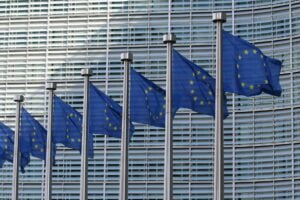This content was created by the Data Sharing Coalition, one of the founding partners of the CoE-DSC.
The Data Sharing Coalition supports organisations with realising use cases at scale to exploit value potential from data sharing and helps organisations to create required trust mechanisms to share data trusted and secure. In our blog section ‘Q&A with’, you learn more about our participants and their thoughts, vision and ideas about data sharing. Daniël den Boer, co-founder and CEO and Sten Reijers, co-founder and CTO of Vaulut, share their thoughts.
1. Could you briefly introduce your organisation?
Vaulut is a technology start-up that builds transaction infrastructure for smart ecosystems of mobility, energy and urban transformation. Our platform provides an interoperable transaction layer between machines, humans and organisations by enabling easy, secure and scalable exchange of data and payments. Through our infrastructure core services, we enable smart ecosystems to deliver customer-centric, cross-domain services and unlock monetisation opportunities across mobility, energy and smart city services.
In such business ecosystem environments, trust between users, machines and organisations is vital, which is why our solution is based on Distributed Ledger Technology, a well-known emerging transaction technology. Our generic transaction engine makes this technology practically applicable and allows companies to unlock the value of smart, connected devices. This creates a seamless user experience, new business models and reduces costs.
2. To what extent is your organisation involved in data sharing (within and across sectors)?
In a digital dimension, all relations are transactions, even when it comes to data sharing. All these digital (data) transactions require the establishment of trust. Our technology facilitates this by providing a digital identity to everyone and everything. Enabled by cryptographic proofs and digital signatures, we ensure verification of data origin and integrity. This way, trust can be established, even between two machines, which in turn allows (data) transactions to take place digitally in a secure and seamless manner and even autonomously between humans, smart devices and organisations. Hence, data sharing is at the heart of what we do.
This is especially (and increasingly) relevant in the mobility, energy and smart city domains. For example, an autonomous vehicle will need to perform transactions such as paying for parking, charging and paying toll based on the exact amount that is consumed. Many other mobility services for smart, connected cars are being developed like reward schemes for eco-friendly behaviour, seat heating as a service, but also direct monetisation of vehicle data. All these services – data-driven pay-per-use services or direct data monetisation – require some form of data sharing. Through our transaction infrastructure solution, we help mobility companies implement these services.
Likewise, in the energy domain, we facilitate the shift to local energy markets. This requires smart, connected devices that produce and consume energy and trade this peer-to-peer. For this to happen, prosumer devices need to advertise their flexibility and prosumers need to be able to seamlessly pay for energy. Many data is shared in these use cases, all of which needs to adhere to privacy and security regulations and provide data sovereignty for all actors involved.
3. Why is or should sharing data be important for your industry or domain?
Customer expectations and technology are driving change in the mobility, energy and smart city domains. Businesses need to switch to more customer-centric services. At the centre of these smart services are smart, connected devices that have the opportunity to unlock more sustainable, efficient and affordable solutions through the data they produce. Take for example electric vehicles which can be used to offer flexibility in a smart energy grid, so-called Vehicle-to-Grid. The vehicle will need to securely share data and transact in order for this to work.
The single most important ingredient to establish this kind of collaboration and create an ecosystem of digital transactions is trust. Trust propels collaboration between organisations and facilitates the creation of business ecosystems. We provide the infrastructure to establish this trust and facilitate the creation of the next generation of smart services, which is reliant on secure transactions and sovereign data sharing.
The Data Sharing Coalition provides a great ecosystem with pioneers and trailblazers in the field of data sharing with inspiring and insightful thoughts.
4. What are the most promising data sharing developments and trends you see in your sector?
We all know data is the most important asset of the 21st century. Unfortunately, we are not even close to realising its true value. Big tech companies have shown the world that there is tremendous potential in data. However, it also became clear that regulations for data sharing had to be put in place. This caused a healthy shift to put consumers back in control of their own data. This reverse mechanism, where consumers will get to decide who they share data with, in many cases will naturally keep people from sharing data if they don’t get any value in return. This has caused companies to realise that they must offer something in exchange, usually in the form of an improved or completely new service for the customer.
Companies in our sectors are beginning to realise that to unlock the value of connectivity and data, they must offer data-driven customer-centric services, which in many cases involves data sharing. This realisation is driving companies to explore different data sharing capabilities as part of the solution to create new value for customers, which is ultimately what matters most.
Another promising trend is that data is increasingly being treated as a new asset class, a resource of economic value, which must be managed as an asset. This means that in some cases, the act of data sharing is turning into data transactions, where data is just another digital type of value. It’s still very early days in this data economy, but it is a promising trend that helps restore the balance in a world where data sharing is currently a one-sided trade.
5. How do you see the future of data sharing, and what steps are you currently taking in that direction?
We focus on use cases with smart, connected devices at the centre, such as vehicles, infrastructure and decentralised energy resources. As we move towards autonomous electric mobility and decentralised energy systems, these devices will need to take care of transactions in the background. Cross-domain data sharing will become the norm as it is the only way to realise the full potential of smart, connected devices.
As a company, we build infrastructure that allows other companies to rapidly develop new services by incorporating core services like digital identity, payments and secure data sharing directly into the core infrastructure. This way, we aim to create a solid foundation for companies so they can focus on building great services and applications.
6. Why are you participating in the Data Sharing Coalition?
The market for decentralised transaction technology is only just emerging and there is a lot of noise. We share many of the views of the Data Sharing Coalition, such as the importance of data sovereignty and cross-domain data sharing, so we consider it a great platform to share our expertise and help industry players with their challenges. It also provides a great ecosystem with pioneers and trailblazers in the field of data sharing that have inspiring and insightful thoughts.




